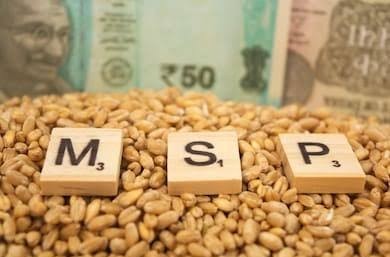SumitCreator
Why doesn't the Modi government accept the MSP of farmers? Know what are the reasons
The farmers, who are traveling from Punjab Haryana state towards Delhi, are opposing three agricultural laws made by the central government recently.
According to the All India Kisan Sangharsh Coordination Committee, one in every of their important demands is, "Government should declare purchases at a price below the Minimum Support Price (MSP) against the law and also the government purchases are applicable to the MSP."
The Prime Minister himself has tweeted on the MSP saying, "I have said this before and yet again I say, the system of MSP will continue, Government procurement will continue. We are here to serve our farmers. We help the donors we'll make every effort and ensure a far better life for his future generations. "
Prime minister Narendra Modi Tweet
But the govt. isn't able to write this within the bill. the govt. argues that even in its earlier laws, there was no such thing in writing. Therefore, it's not been included within the new bill.
But is it really easy, as is being argued?
In fact, government purchases on MSP are ongoing and declaring the acquisition of crops at but that, isn't as easy as farmer organizations are feeling.
Why is it difficult for the govt to try and do this?
Before knowing this, it's important to understand what MSP is and the way it's fixed.
What is MSP?
In order to safeguard the interests of farmers, the minimum support price (MSP) system has been implemented within the country. whether or not the worth of crops falls in keeping with the market, even then the Central Government buys the crop from the farmers only at the fixed minimum support price in order that the farmers will be saved from damage.
The MSP of a crop is that the same within the whole country. The Ministry of Agriculture, Government of India, determines the MSP supported the recommendations of the Commission for Agricultural Costs and costs (Commission for Agriculture Costs and costs CACP). Under this, 23 crops are being purchased straight away.
These 23 crops include crops like paddy, wheat, jowar, millet, maize, moong, groundnut, soybean, sesame and cotton.
According to an estimate, only 6 percent of the farmers within the country get MSP, of which the most number of farmers are from Punjab Haryana. and since of this, opposition to the new bill is additionally happening more in these areas.
What has changed from the agricultural law so far?
Former Agriculture Secretary of the govt. of India Siraj Hussain says that there are some reasons behind the priority of farmers about MSP. the govt. has not yet issued any such order in writing that government procurement of crops will continue. Whatever is occurring till now's verbal. this is often one reason for the growing concern of farmers after the new agricultural law.
The thing to notice here is that the govt procurement will continue, its order needs to come not from the Ministry of Agriculture but from the Ministry of Food Processing Industries.
The second reason isn't to relinquish the agricultural Infrastructure Development Fund to the state governments. The central government wont to give this fund of three percent to the state governments per annum. But this year the central government has refused to relinquish this fund. This fund was accustomed build rural infrastructure (including agricultural facilities).
After the formation of the new agricultural law, these two important changes are visible to the farmers.
Reason 1: How will the standard standards of crops be determined?
Siraj Hussain says that if the supply of purchase on MSP is added to the law then how will the law be followed? MSP is often for a 'Fair Average Quality'. That is, the minimum support price are going to be given as long as there's a hard and fast quality of the crop. Now whether a crop fits the standard standards or not, how will or not it's decided?
What will happen to the crop that may not meet those standards?
In such a situation, if the govt also incorporates the demand of farmers within the law, then it'll be difficult to implement the law.
Reason 2: Less likely government purchases within the future
Regarding the second reason, Siraj Hussain says that several committees have recommended to the govt. that the govt should reduce the acquisition of wheat and paddy. the govt. has reports associated with it from Shanta Kumar Committee to NITI Aayog.
The government is additionally working under this objective. This purchase goes to decrease within the coming days. This fear is additionally haunting the farmers.
In such a situation, if the govt. will buy the crop or not, then what proportion, and when it'll not be bought, if it's not fixed, then how can the MSP talk in writing within the law?
RS Ghuman could be a professor at the middle for Research in Rural and Industrial Development, Chandigarh. they need a powerful hold on agriculture and economics. within the conversation with the BBC, he has listed many reasons besides the above arguments, because of which the govt isn't accepting the MSP related demands of the farmers.
Reason 3 - Private companies won't be able to buy crop on MSP
According to RS Ghuman, if the governments buy less within the future, then obviously farmers will sell crops to personal companies. If private companies buy on MSP, then they'll be hurt (market prices don't seem to be always same) and if they buy less then they're going to be sued. (If the govt accepts the MSP condition of the farmers).
Therefore, the govt doesn't want to impose this condition on private companies. There are some interests of the govt. also involved during this and personal companies also will have problems with this.
Although holding the post of Agriculture Secretary within the Central Government, Siraj Hussain doesn't believe that the govt. doesn't want to try and do so thanks to the dominance of the company. they are doing not accept this argument.
Reason 4 - Farmers might also be in trouble
According to RS Ghuman, the government's hesitation on MSP in terms of economy can even be understood in in our own way. For this, it's necessary to know two words.
The first word is 'monopoly'. Meaning when the vendor sells only 1 more arbitrary price, he charges an arbitrary price.
The second word is 'monopony'. this implies that the customer is simply one and is bigoted, that is, he will buy goods at whatever price he wants.
RS Ghuman says that with the new laws elapsed the govt., the agriculture sector goes to be a 'monopause' within the coming days. If only some companies make cartels within the agricultural sector, the farmers will must sell the products at the value they decide.
If the supply of MSP is added to the law, then the domination of personal companies over the farmers may end. The result may additionally be that these companies will buy fewer crops.
There is no way for the govt. to force private companies to shop for the whole crop on MSP. That too when the govt. wants to shop for less crop of farmers.
In such a situation, the matter may increase for the farmer. To whom will he sell his crop? In such a situation, the MSP may additionally not be able to recover its costs.
Reason 5: the premise of the worth of the crop - the govt. wants to avoid making decisions
Says RS Ghuman, "MSP - gives farmers a minimum basis for fixing the value of the crop, gives a point of reference in order that the worth of the crop isn't but that. The MSP provides them a social insurance.
Whereas private companies fix the costs of products per the demand and provide. this is often their argument.
Therefore, the govt. doesn't want to urge into a dispute on each side.
The government wants to stay the complete matter bilateral. If the availability of MSP is added to the law, every lawsuit involving it'll involve three parties - a government, a farmer and a 3rd private company.
What is the solution to the dispute?
It is estimated that 85 percent of small farmers in India have but five acres of land for cultivation.
RS Ghuman believes that declaring the acquisition even after declaring the offense to the MSP doesn't end the dispute. the sole solution is to withdraw all three laws.
At the instant the govt doesn't appear able to withdraw the law.
But Siraj Hussain, former agriculture secretary, says that one in all the ways is to provide direct financial assistance to the farmers, as is being done through the Kisan Samman Nidhi.
And the second measure is that farmers should grow other crops which are in demand within the market. At present, farmers focus more on wheat, paddy and farmers pay less attention on pulses and oil seeds. With this, market dynamics will remain















No comments:
Post a Comment